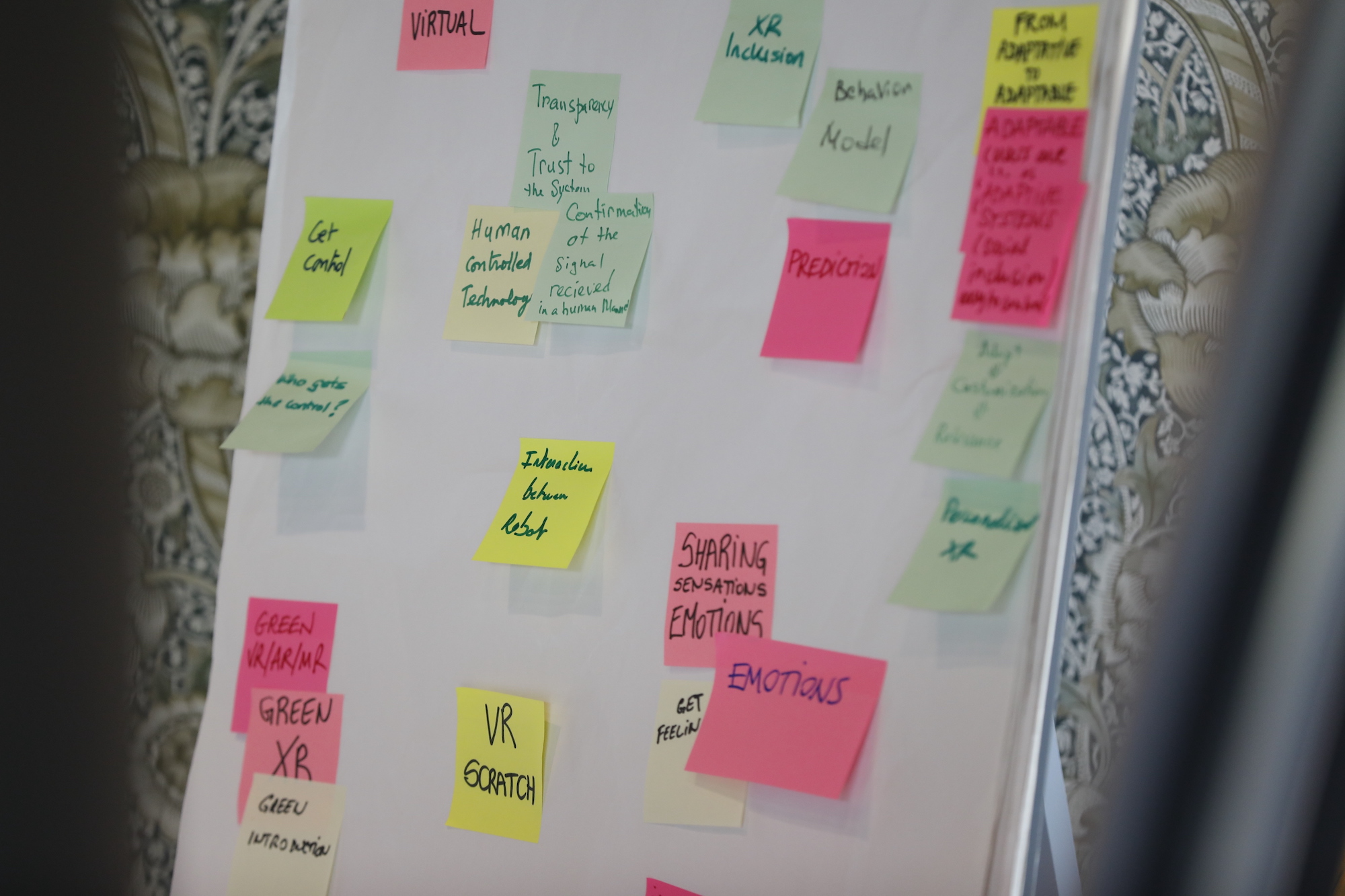
Laval Virtual's Visionaries Think Tank tries to identify the future evolutions of new technologies.
Crédits photos : Prisma / Laval Virtual 2021
What will the immersive technologies like virtual reality and augmented reality look like 10 years from now? This question is asked every year by the Visionaries Think Tank participants. Organized before the VR/AR exhibition Laval Virtual, this 2-day prospective workshop invites industry leaders and academic representatives to think on the next trends in the use of these technologies. The goal? Anticipating the technological evolutions to better manage them in the future.Explanations and feedback on the 2021 edition with Marie Leblanc, Head of Services at Laval Virtual.
What’s a Think Tank?
The term “Think Tank” refers to the image of a laboratory of ideas. It’s a focus group that brings together several experts to discuss a topic of society. Ultimately, the goal is to provide a report to decision makers to guide public policy decisions. Here is a more in-depth definition of a Think Tank:
“The Think Tank gives local governments, regional agencies, communities and universities a chance to discuss issues related to a topic. Typically, a Think Tank analyzes current strategies and approaches. The goal is to consider societal developments and directions, and to provide guidance for improving approaches over the long term and identifying research needs.”
At Laval Virtual, the Visionaries Think Tank deals with immersive technologies and new technologies in general, with a particular focus on their future impact in the years to come. “The goal is to identify trends and best practices to guide future developments,” explains Marie Leblanc. So, since 2016, the Visionaries Think Tank at Laval Virtual has been looking at the profound changes new technologies will have on society, each time with a ten-year horizon.
How does the Visionaries Think Tank at Laval Virtual work?
Each year, several virtual and mixed reality experts are invited to this event. In 2021, the Laval Virtual Think Tank brought together international academics and industry:
- Miriam Reiner, Head of the Virtual Reality and Neurocognition lab at Israel Institute of Technology;
- Judith Okonkwo, Founder of Imisi3D;
- Indira Thouvenin, Teacher-researcher on virtual reality at the University of Technology of Compiègne;
- Edouard Auvinet, Researcher on virtual reality in the medical and health field;
- Andrey Lunev, Founder of XR Insight Europe;
- and representatives from Alstom, MBDA and Thales.
These “visionaries” met on July 5 and 6, 2021 at Domaine Le Corbusson, near Laval (Mayenne, France). Each year, the Visionaries Think Tank takes place before the virtual, mixed and augmented reality exhibition Laval Virtual Europe. The two days were moderated by Marie Leblanc, Head of Services at Laval Virtual, and Simon Richir, scientific director and co-founder of Laval Virtual.
During the Think Tank, each participant presents his vision of the evolution of immersive technologies. All the ideas are then confronted during a collective brainstorming session. “We gather all the ideas to see which ones stand out. We then select what we think are the research topics to work on, those that will impact society by 2030. Finally, we explore these topics further the next day in small working groups.” It is from these collective reflections that a global vision will emerge.

What will immersive technologies look like in 2030?
At the 2021 edition, the visionaries considered the question: how will virtual reality impact society by 2030? “Two strong points came out of the Think Tank this year: a more inclusive XR technology and a more human oriented,” says Marie Leblanc.
On the one hand, visionaries have noticed limited access to virtual reality technologies, which are mainly present in Europe, Asia and the United States. “The market is limited and reserved for an elite. There are also connectivity issues. In the end, these technologies are not accessible to everyone.” The challenge will therefore be to provide access to education around these immersive technologies, but also to make them accessible to everyone.
On the other hand, it is necessary to create a human-centered approach, especially at the brain level. “We notice that it doesn’t work when developers try to reproduce exactly what is real in virtual,” explains Marie Leblanc. “When you design a virtual reality experience, you have to address the brain and give it elements that it will be able to interpret. The goal of a virtual world is not to reproduce reality. It is above all necessary that the brain understands this world.” This is also the challenge of creating more natural interactions that adapt to humans (less latency, more connectivity, invisible text…).
Perspectives and results of a Think Tank
At each edition of the Laval Virtual Think Tank, visionaries try to predict the evolution of technologies in the next ten years. For example, in 2019, the vision had concluded an emergence of “new simulated realities […]. They will exist in persistent or ephemeral forms […]. They will lead to new business models and new paradigms in many sectors such as healthcare and education.“
Two years later, this vision has been confirmed, with the development of virtual worlds, and with the evolution of the social dimension of virtual reality. Moreover, the health and education sectors have been the most rapidly and profoundly transformed by the new technologies, as predicted. However, these evolutions did not appear ten years later, the health crisis having accelerated them.
More than prediction, the Laval Virtual Think Tank wants to identify and then anticipate and develop solutions that respond to the identified evolutions. But this must go beyond research topics. “Next year, we would like to include governmental organizations capable of impacting the laws that would regulate the use of technologies towards a direction where the human is at the heart,” says Marie Leblanc. More than a discussion group, the Laval Virtual Think Tank wants to be a driver of concrete actions around the use of new technologies.

